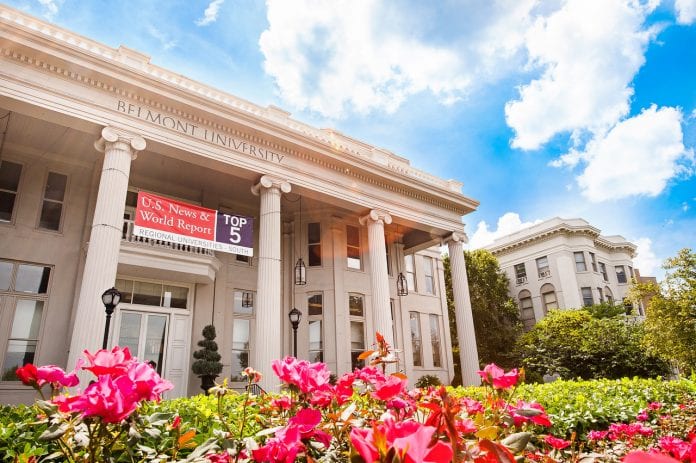University scores accolades for innovation, teaching, veteran support and more
For the ninth consecutive year, Belmont University has again achieved a Top 10 regional ranking with today’s release of U.S. News & World Report’s 2018 edition of America’s Best Colleges, this year ranking at an impressive No. 5 and remaining the highest ranked university in Tennessee in this category. Moreover, Belmont won the praise of its peers as it was included on a number of additional U.S. News lists that rate institutions on areas critical to student opportunities and success.
Belmont President Dr. Bob Fisher said, “These rankings provide benchmarks that are helpful to us as we work to provide programs that equip our students to go out and make a positive impact in the world. While it is rewarding to see Belmont reach a higher ranking overall, it is especially gratifying to be recognized by our peers for excelling in areas that promote strong outcomes for our students. As a student-centered university, this is at the heart of what we aim to achieve.”
In the publication released today, Belmont is lauded for the tenth year in a row for its commitment to “making the most innovative improvements in terms of curriculum, faculty, students, campus life, technology or facilities,” landing second on the “Most Innovative Schools” in the South list. Belmont earned acclaim in the following categories as well:
-
- Strong Commitment to Undergraduate Teaching (No. 4 in the South): The strong commitment to undergraduate teaching ranking is determined via a survey of peer institutions, who cite their fellow institutions who best reflect that quality.
- Best Colleges for Veterans (No. 3 in the South): To be included, institutions must be ranked in the top half of their overall category, be certified for the GI Bill and participate in the Yellow Ribbon Program with 20 or more veterans/active service members enrolled.
- Best Value (one of only 64 institutions recognized in the South): The listing takes into account a school’s academic quality and net cost of attendance for a student who received the average level of need-based financial aid. The higher the quality of the program and the lower the cost, the better the deal.
- Internships (one of only 20 institutions recognized in the nation): Schools in this category encourage students to apply what they’re learning in the classroom to work in the real world through closely supervised internships or practicums.
- Learning Communities (one of only 18 institutions recognized in the nation): In these communities, students typically take two or more linked courses as a group and get to know one another and their professors well.
- Service-Learning (one of only 23 institutions recognized in the nation): Required volunteer work in the community is an instructional strategy in these programs—what’s learned in the field bolsters what happens in class and vice versa.
- Study Abroad (one of only 44 institutions recognized in the nation): Programs must involve substantial academic work abroad and considerable interaction with local culture
Belmont Provost Dr. Thomas Burns said, “This has been an extraordinary fall for Belmont. We started the fall semester Belmont by announcing a record-breaking enrollment number for the 17th consecutive year – reaching a total of 8,080 students on campus. These students remind us every day that they are drawn to Belmont by the diversity and academic strength of our programs as well as by the intentional commitment to student success, as highlighted in the U.S. News rankings. I’m particularly proud of this incoming undergraduate class which brings, on average, the highest entering scores on the ACT (average 26.4) in the past four years. As an institution, we are committed to continue to do our best to fulfill the Belmont mission of providing an academically challenging education that will enable our students to engage and transform the world with disciplined intelligence, compassion, courage and faith.”
The U.S. News analysis places Belmont in a premier position among the 135 public and private institutions included in the South region, an area that covers Tennessee, Virginia, West Virginia, North Carolina, South Carolina, Georgia, Alabama, Florida, Kentucky, Arkansas, Mississippi and Louisiana.



